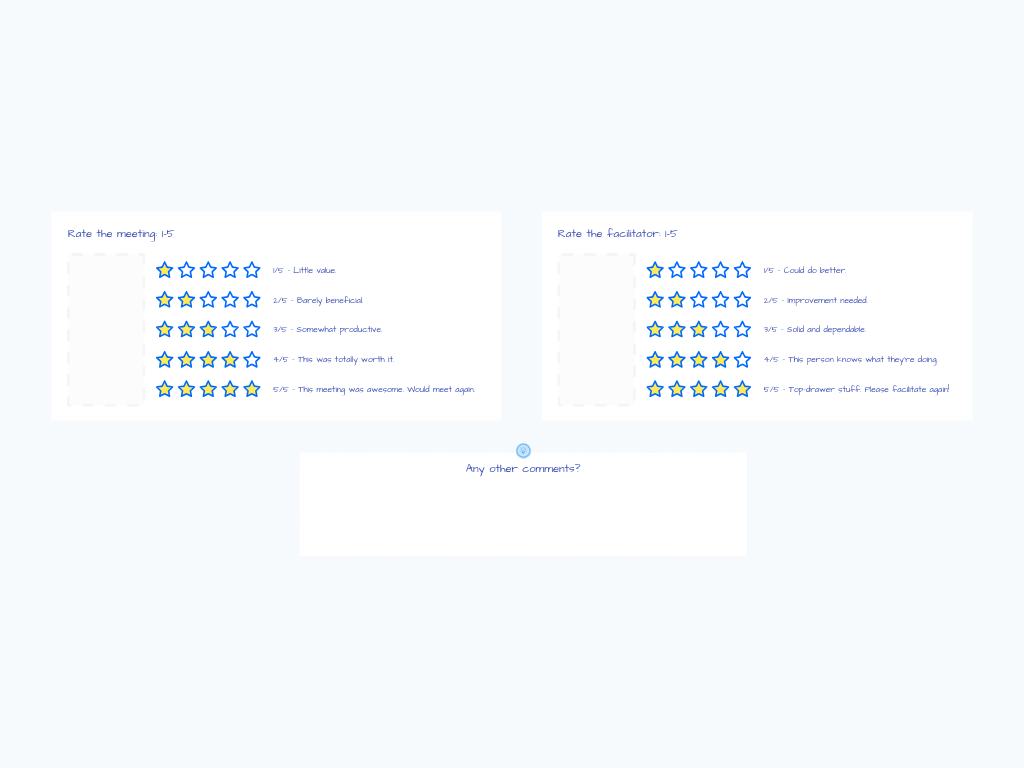ROTI: Meeting Value 1-5
Return on Time Invested (ROTI) is a quick, effective feedback mechanism that measures how valuable participants found your meeting. This simple 1-5 rating scale gives you immediate insight into meeting effectiveness and helps improve future sessions for development and product teams.
What Is the ROTI Method?
ROTI (Return on Time Invested) is a lightweight retrospective technique that measures the perceived value of a meeting relative to the time spent. Developed as part of agile methodologies, this approach uses a simple 1-5 scale where:
- 1 = The meeting was a complete waste of time
- 2 = Some value, but not worth the time invested
- 3 = Equal value to time invested
- 4 = More value than time invested
- 5 = Exceptional value for time invested
The visual rating system provides a clear, quantifiable measure of meeting effectiveness that teams can track over time.
Benefits & When to Use
Use the ROTI method:
- At the end of any meeting, workshop, or retrospective
- When you want quick feedback without a lengthy discussion
- To establish a baseline for meeting effectiveness
- For tracking meeting improvement over time
- When introducing new meeting formats or agendas
Benefits include:
- Takes less than 2 minutes to complete
- Provides actionable data about meeting quality
- Encourages honest feedback in a safe format
- Creates accountability for meeting facilitators
- Helps identify which meetings need restructuring or elimination
How to Run a ROTI Session
Introduce the concept (30 seconds)
- Explain the ROTI scale from 1-5
- Clarify that you're looking for honest feedback to improve future meetings
Ask participants to vote (1 minute)
- Request that each team member place a token on the number that represents their rating
- Remind participants that voting is anonymous and honest feedback is valuable
Optional: Collect additional context (2-3 minutes)
- If ratings are lower than expected, ask for brief comments on how to improve
- For high ratings, ask what specifically made the meeting valuable
Review the results (1 minute)
- Calculate the average score if needed
- Acknowledge the feedback and commit to specific improvements
Track over time (ongoing)
- Record the ROTI scores for each meeting type
- Look for patterns and improvements as you adjust your meeting approach
Total time: 2-5 minutes
Tips for a Successful ROTI Session
- Keep it quick – The ROTI exercise should take minimal time at the end of your meeting
- Maintain psychological safety – Create an environment where honest feedback is welcomed
- Don't over-explain – The simplicity of the 1-5 scale is its strength
- Avoid defensive reactions – If scores are low, view this as valuable information rather than criticism
- Take action on feedback – Make visible changes based on consistent low scores
- Consider timing – Run the ROTI before people start leaving the meeting
- Use the data – Compare scores across different meeting types to identify which formats work best for your team
When used consistently, the ROTI method helps development teams optimize their meeting time and build a culture of continuous improvement in their collaboration practices.



